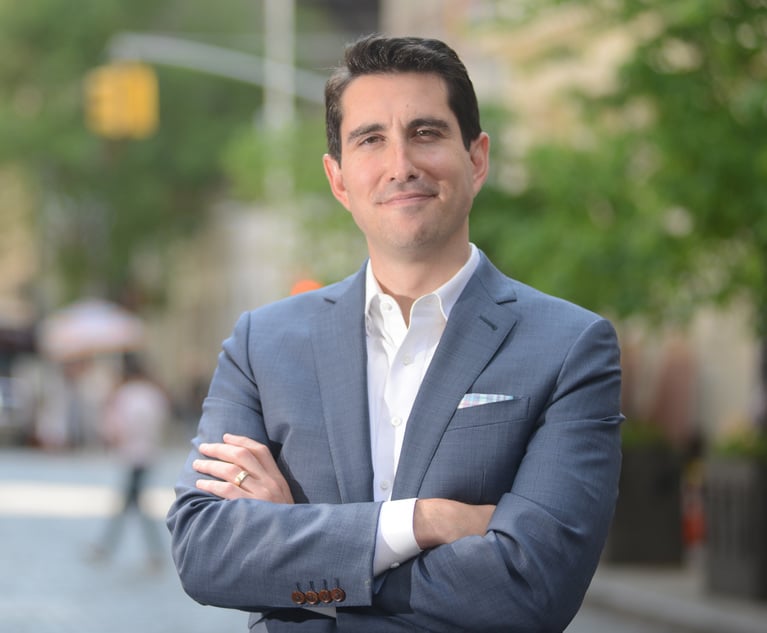In-House Leaders: The Future of IP Law Is Global, Data-Driven
At Wednesday's IPForward Conference in San Francisco, the Recorder took a look into the crystal ball with in-house IP luminaries.
April 12, 2018 at 03:05 PM
2 minute read
 Credit: Shutterstock.com
Credit: Shutterstock.com IP attorneys and legal staff at corporations are no strangers to innovation—they work with inventors every day.
But in recent years those working on intellectual property in legal departments have increasingly become innovators themselves. Amid a whirlwind of new technologies and strategies, IP's legal leaders are looking to the future of the field.
On the sidelines of Wednesday's IPForward Conference in San Francisco, a number of IP specialists who have worked at major legal departments spoke with the Recorder about their predictions for in-house IP.
Facebook Inc. patent attorney Gilbert Wong and Sophos' senior IP paralegal Cheryl Wilder's answers revolved around one word: data.
“The future of IP looks like the use of more analytic tools—using the data to inform decisions and being able to provide a tool set for our counsel so they can quickly get the information they need with the least amount of friction, and see all the data with push of a button,” Wong said.
Wilder said data's allowing her legal department to better estimate the scope of future challenges and IP spend. They'll also be using data to run an IP portfolio analysis and to be more proactive with issues such as confronting nonpracticing entities, also known as “patent trolls.”
“We're definitely in an accelerated pace of technological change,” Wilder said. “I think with the better awareness and knowledge that [our management software] IPFolio gives us, it allows us to maintain that pace. We can manage our costs better with better metrics, and we'll be able to have a better budget and be proactive.”
John Schiffhauer, who was, until recently, vice president of IP at Intel Corp., said the future of IP is global. He's seen a pendulum of IP action swing between the U.S. and MENA [the Middle East and North Africa], as well as China. For IP in-house leaders who want to stay ahead of the game, he says it's important for lawyers to pay attention to where the action is happening.
“You're seeing more actions outside the U.S., in China and MENA more generally, and you've seen corrections back in the U.S.,” he said. “Lawyers need to know what's going on in order to stay on top of this.”
This content has been archived. It is available through our partners, LexisNexis® and Bloomberg Law.
To view this content, please continue to their sites.
Not a Lexis Subscriber?
Subscribe Now
Not a Bloomberg Law Subscriber?
Subscribe Now
NOT FOR REPRINT
© 2025 ALM Global, LLC, All Rights Reserved. Request academic re-use from www.copyright.com. All other uses, submit a request to [email protected]. For more information visit Asset & Logo Licensing.
You Might Like
View All
Kraken’s Chief Legal Officer Exits, Eyes Role in Trump Administration
3 minute read

Collectible Maker Funko Wins Motion to Dismiss Securities Class Action

How Tony West Used Transparency to Reform Uber's Toxic Culture
Trending Stories
- 1'A Death Sentence for TikTok'?: Litigators and Experts Weigh Impact of Potential Ban on Creators and Data Privacy
- 2Bribery Case Against Former Lt. Gov. Brian Benjamin Is Dropped
- 3‘Extremely Disturbing’: AI Firms Face Class Action by ‘Taskers’ Exposed to Traumatic Content
- 4State Appeals Court Revives BraunHagey Lawsuit Alleging $4.2M Unlawful Wire to China
- 5Invoking Trump, AG Bonta Reminds Lawyers of Duties to Noncitizens in Plea Dealing
Who Got The Work
J. Brugh Lower of Gibbons has entered an appearance for industrial equipment supplier Devco Corporation in a pending trademark infringement lawsuit. The suit, accusing the defendant of selling knock-off Graco products, was filed Dec. 18 in New Jersey District Court by Rivkin Radler on behalf of Graco Inc. and Graco Minnesota. The case, assigned to U.S. District Judge Zahid N. Quraishi, is 3:24-cv-11294, Graco Inc. et al v. Devco Corporation.
Who Got The Work
Rebecca Maller-Stein and Kent A. Yalowitz of Arnold & Porter Kaye Scholer have entered their appearances for Hanaco Venture Capital and its executives, Lior Prosor and David Frankel, in a pending securities lawsuit. The action, filed on Dec. 24 in New York Southern District Court by Zell, Aron & Co. on behalf of Goldeneye Advisors, accuses the defendants of negligently and fraudulently managing the plaintiff's $1 million investment. The case, assigned to U.S. District Judge Vernon S. Broderick, is 1:24-cv-09918, Goldeneye Advisors, LLC v. Hanaco Venture Capital, Ltd. et al.
Who Got The Work
Attorneys from A&O Shearman has stepped in as defense counsel for Toronto-Dominion Bank and other defendants in a pending securities class action. The suit, filed Dec. 11 in New York Southern District Court by Bleichmar Fonti & Auld, accuses the defendants of concealing the bank's 'pervasive' deficiencies in regards to its compliance with the Bank Secrecy Act and the quality of its anti-money laundering controls. The case, assigned to U.S. District Judge Arun Subramanian, is 1:24-cv-09445, Gonzalez v. The Toronto-Dominion Bank et al.
Who Got The Work
Crown Castle International, a Pennsylvania company providing shared communications infrastructure, has turned to Luke D. Wolf of Gordon Rees Scully Mansukhani to fend off a pending breach-of-contract lawsuit. The court action, filed Nov. 25 in Michigan Eastern District Court by Hooper Hathaway PC on behalf of The Town Residences LLC, accuses Crown Castle of failing to transfer approximately $30,000 in utility payments from T-Mobile in breach of a roof-top lease and assignment agreement. The case, assigned to U.S. District Judge Susan K. Declercq, is 2:24-cv-13131, The Town Residences LLC v. T-Mobile US, Inc. et al.
Who Got The Work
Wilfred P. Coronato and Daniel M. Schwartz of McCarter & English have stepped in as defense counsel to Electrolux Home Products Inc. in a pending product liability lawsuit. The court action, filed Nov. 26 in New York Eastern District Court by Poulos Lopiccolo PC and Nagel Rice LLP on behalf of David Stern, alleges that the defendant's refrigerators’ drawers and shelving repeatedly break and fall apart within months after purchase. The case, assigned to U.S. District Judge Joan M. Azrack, is 2:24-cv-08204, Stern v. Electrolux Home Products, Inc.
Featured Firms
Law Offices of Gary Martin Hays & Associates, P.C.
(470) 294-1674
Law Offices of Mark E. Salomone
(857) 444-6468
Smith & Hassler
(713) 739-1250






